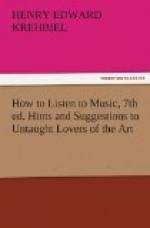If I were to attempt a definition it would be this: Classical composers are those of the first rank (to this extent we yield to the ancient Roman conception) who have developed music to the highest pitch of perfection on its formal side and, in obedience to generally accepted laws, preferring aesthetic beauty, pure and simple, over emotional content, or, at any rate, refusing to sacrifice form to characteristic expression. Romantic composers are those who have sought their ideals in other regions and striven to give expression to them irrespective of the restrictions and limitations of form and the conventions of law—composers with whom, in brief, content outweighs manner. This definition presents Classicism as the regulative and conservative principle in the history of the art, and Romanticism as the progressive, regenerative, and creative principle. It is easy to see how the notion of contest between them grew up, and the only harm which can come from such a notion will ensue only if we shut our eyes to the fact that it is a contest between two elements whose very opposition stimulates life, and whose union, perfect, peaceful, mutually supplemental, is found in every really great art-work. No law which fixes, and hence limits, form, can remain valid forever. Its end is served when it enforces itself long enough to keep lawlessness in check till the test of time has determined what is sound, sweet, and wholesome in the innovations which are always crowding eagerly into every creative activity in art and science. In art it is ever true, as Faust concludes, that “In the beginning was the deed.” The laws of composition are the products of compositions; and, being such, they cannot remain unalterable so long as the impulse freshly to create remains. All great men are ahead of their time, and in all great music, no matter when written, you shall find instances of profounder meaning and deeper or newer feeling than marked the generality of contemporary compositions. So Bach frequently floods his formal utterances with Romantic feeling, and the face of Beethoven, serving at the altar in the temple of Beauty, is transfigured for us by divine light. The principles of creation and conservation move onward together, and what is Romantic to-day becomes Classic to-morrow. Romanticism is fluid Classicism. It is the emotional stimulus informing Romanticism which calls music into life, but no sooner is it born, free, untrammelled, nature’s child, than the regulative principle places shackles upon it; but it is enslaved only that it may become and remain art.
FOOTNOTES:
[B] “Studies in the Wagnerian Drama,” p. 22.
[C] “Beethoven and His Nine Symphonies,” by George Grove, C.B., 2d ed., p. 191.
IV
The Modern Orchestra
[Sidenote: The orchestra as an instrument.]




